County Board Strategizes on 2012-13 Budget
Washtenaw County board of commissioners budget retreat (Feb. 9, 2011): For two hours last Wednesday evening, commissioners continued a discussion on priorities aimed at guiding budget decisions – both long-term and immediate – for county government.
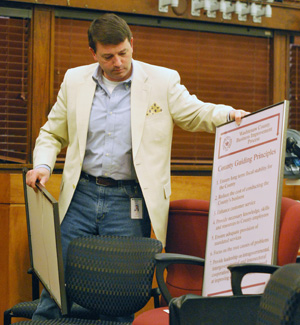
Bill Reynolds, Washtenaw County's deputy administrator, with a framed copy of the county's "guiding principles."
The discussion was another step toward developing a framework that county administrator Verna McDaniel and her staff can use in their budget planning for 2012 and 2013, when the county faces a projected $20.9 million deficit. The session followed a five-hour Jan. 29 retreat. The board also plans to continue their budget talks on Feb. 23, after their regular administrative briefing.
Conan Smith, chair of the board, told the group he hoped they could form an outline of their priorities – not in terms of programs, but at a policy level. He said that focusing on specific programs at this point would limit the administration’s flexibility for future restructuring.
During the two-hour session, commissioners talked about the importance of providing a safety net of services for residents who are most in need – perhaps through a combination of the county’s own services, and partnerships with outside agencies. Though some commissioners expressed concerns about privatizing, there seemed to be consensus about exploring ways to market the county’s infrastructure services – like payroll processing and human resources – to other local municipalities.
They discussed the need for more self-reliance on local resources, as opposed to state and federal funding – while acknowledging the dependence that many county programs have on state and federal grants. The board also talked about the importance of balancing short-term budget needs with long-term investments that could bring more significant structural savings in future years.
Also during Wednesday’s retreat, some commissioners noted the importance of keeping all budget discussions in public view. The retreats – unlike the board’s regular meetings and working sessions – are not televised, though they are open to the public. In addition to county commissioners, the retreats are attended by other elected officials and county staff.
The bulk of Wednesday’s session focused on trying to craft a framework to prioritize “county business.” Of the five topics sketched out as possible parts of that prioritization framework, the group tackled three on Wednesday night, which can be recast as grouped questions: (1) Is a service mandated by state law? (2) Is a service part of the basic reason county government exists? Does a service address longer-term root causes of problems? Does a service address crisis situations? and (3) Does the county itself currently operate a program? Does the county invest in some outside agency to provide a program?
Because of time constraints, commissioners decided to continue discussion on the remaining two topics at their next session. Those topics are: (1) Is it better to provide world-class services, but fewer of them? Is it better to provide a broader range of services, but at lower levels? and (2) Should commissioners prefer solutions that have a sustainable, long-term budget impact or those that address immediate needs?
Before tackling these questions, commissioner Ronnie Peterson asked whether they should revisit the county’s “guiding principles,” which were adopted several years ago. Will their decisions be consistent with those? They should either abide by the principles, he said, or change them. Bill Reynolds, deputy county administrator, fetched a framed copy of the guiding principles that was hanging in the boardroom. The principles are:
1. Ensure long term fiscal stability for the county.
2. Reduce the cost of conducting the county’s business.
3. Enhance customer service.
4. Provide the necessary knowledge, skills and resources to county employees to carry out these principles.
5. Ensure adequate provision of mandated services.
6. Focus on the root causes of problems that affect the quality of life of county citizens by aggressively pursuing prevention strategies
7. Provide leadership on intragovernmental, intergovernmental and intersectoral cooperation and collaboration aimed at improving services to county citizens.
Smith suggested that Peterson’s question should be the topic for a future Wednesday retreat discussion. Kristin Judge said she also wanted to make sure they sought constituent input as the budget process moves forward. It’s important to get feedback about what priorities residents have regarding county services, she said.
This report summarizes the key points of the board’s two-hour discussion.
Mandated vs. Non-Mandated Services
In introducing the topic of mandated vs. non-mandated services, Conan Smith (D-District 10) noted that the priorities in Lansing – where the state legislature sets mandates for services that local governments must provide – might not be the county’s priorities. How does the board answer the question of serviceability, or guide the administration to determine what levels of mandated services they should provide?
Leah Gunn (D-District 9) characterized this as a crucial issue. “World-class service may not be attainable,” she said. Many of the non-mandated services that the county provides affect people who are most in need, Gunn noted. When asked by Smith to identify some principles that the administration can use to determine levels of serviceability, Gunn suggested getting guidance from the county’s department heads and other elected officials who lead departments, like the treasurer and clerk. She said she knows that Brian Mackie, the county’s prosecuting attorney, disliked the exercise they did during the last budget cycle when departments were asked to identify impacts if their budgets were cut 5%, 10%, 15% or 20%. But that was helpful, she said, because department heads know their operations much better than commissioners do.
While department heads are the best to determine the impact on their operations, Gunn added, it’s up to the board to decide which of those impacts are acceptable. Barbara Bergman (D-District 8) noted that some savings might not be worth it, if the consequence of cuts is too great.
Ronnie Peterson (D-District 6) said they need to keep in mind three different categories: (1) mandated services for departments led by elected officials; (2) mandated services for departments led by staff; and (3) non-mandated services.
Dan Smith (R-District 2) agreed, saying the state had determined that certain services are important enough to mandate, and that most of those mandated services are in departments led by elected officials. Those services are deemed to be core, he said, citing several examples: a place to put people who break the law; a place to file deeds; a way to ensure that flooding is under control. The board needs to keep that distinction in mind during these discussions, he said.
Wes Prater (D-District 4) said that in general, he wanted to see a focus on performance measures and outcomes, to help determine serviceability levels.
Dan Smith pointed out that they can’t ignore the impact of decisions in Lansing. It’s probably too late for this budget cycle, he noted, but they need to lobby for relief from some of the state’s unfunded mandates – they need to lobby for additional state funding for those services. For non-mandated services, he observed that sometimes the county gets a huge return on its investments, by leveraging county dollars to get state or federal funding for programs. When that’s the case, “we should keep doing it,” he said.
Gunn added that lobbying the federal government on these issues is also important.
Regardless of lobbying efforts, Prater said it’s clear the county will need to do more on its own in the future. If they depend on Lansing, “I think you’re only wishful thinking.” The same is true at the federal level, he said. Despite the success of Rep. John Dingell in getting earmarks for his district, which covers much of Washtenaw County, that funding will might evaporate soon, Prater said.
Yousef Rabhi (D-District 11) expanded on Prater’s point, saying the county should try to relocalize what it does, and become self-sufficient as much as possible. That’s what local government is all about, he said.
But Peterson cautioned against taking that approach to the extreme, saying that state and federal funding is a plus for the county. One of the reasons the county has world-class departments is that they’ve been aggressive – and successful – in getting state and federal dollars, he said. Do you walk away from those population groups that are served by these programs? Most of those programs support families and children, he noted. The programs get federal funds, but they aren’t mandated. He urged the board not to abandon these people on principle. “It’s about the babies,” he said.
Bergman said they should at least question how much real benefit they’re getting from programs supported by the county’s general fund, even if they leverage federal dollars.
Prater clarified that he wasn’t advocating to abandon what they already have. If the county can hang on to the funding it’s got, that would be a success, he said. But commissioners need to anticipate that state and federal funding might be eliminated – that’s likely the case with state revenue-sharing dollars, he noted – and they should figure out how to deal with a decrease in outside funding.
Rabhi, too, said he wasn’t advocating to let go of all state and federal funding. But it’s important to look for ways that county government can be more independent.
Rob Turner (R-District 1) brought the conversation back to the underlying issue: The county is facing a $20.9 million deficit. The state and federal government has evolved to make local governments dependent on them, he said, by taking local taxpayer dollars, then returning only a portion to local entities by funding certain programs. Local municipalities rely on the state and federal government to “give us our money back,” he said, but it’s just not happening.
The only way to address the situation is to ask every department to look for excesses in their programs and services, whether they be mandated or non-mandated, Turner said. They’re going to have to survive on less, and it will be difficult. He said he understood that cuts have already been made, but they need to do more, to squeeze out as much efficiency as they can. It should be a bottom-up process, he added, not a top-down decision.
Turner noted that he’d been on a tour that afternoon of several county facilities, and had come away more depressed than happy. [The tour included all four newly elected commissioners – Turner, Alicia Ping, Yousef Rabhi and Dan Smith – as part of their orientation to the county's operations.] Turner observed that the county provides so many great, essential services – and they won’t be able to do it all in the future.
Ping (R-District 3) agreed with Turner, saying it’s clear they can’t be all things to all people. She said their tour of the county children’s services department especially touched her heart. There are employees whose job entails both cooking and janitorial work, she noted, and counselors on the third shift do laundry as well. In many places they’ve already cut to the bone, she said, but they’ll need to do even more.
Gunn thanked Turner for pointing to the bottom line, and reminded her colleagues that in county administrator Verna McDaniel’s state of the county presentation last month, McDaniel had targeted making $8.5 million in cuts to employee compensation and benefits, and another $8.5 million in organizational changes and baseline reductions in the 2012-2013 budget. Gunn indicated that those are daunting cuts.
Conan Smith wrapped up the discussion on the topic by noting that so far, they hadn’t yet identified which non-mandated services they consider sacrosanct – which ones they’ll choose to do, regardless of state or federal support. That’s something they’ll need to address, he said.
Core Business, Root Causes or Crisis Management?
In starting the conversation on this topic, Conan Smith noted that the county exists for some purpose that’s distinct from why a city, state or federal government exists. The county supports services like the county jail, among other things. Rob Turner had previously characterized these as core businesses. How should they prioritize those services, Smith asked, compared to services that address “root causes” – one of the county’s guiding principles. [The principle states: "Focus on the root causes of problems that affect the quality of life of county citizens by aggressively pursuing prevention strategies."]
Smith said they know that when they attack root causes, there’s a long-term gain – but that gain is sometimes hard to quantify. How should they prioritize core services that don’t address root causes? Does a core service automatically take priority? And finally, how should they prioritize services that fall into the category of crisis management?
Yousef Rabhi described the role of government as providing services for those who’ve walked the length of the road, and there’s no more road for them to walk. Government is the safety net, when there’s nowhere else to turn. Of course, he added, it’s prudent to provide services aimed at preventing people from reaching the end of the road. But the county’s focus should be to support people when they most need it.
The most critical services provide food and health care, Barbara Bergman said. Leah Gunn agreed that the county’s role should be to cover holes in the safety net. But how do they do that, given the resources they have?
Ronnie Peterson said he considers core services to be those that are overseen by elected officials like the sheriff, water resources commission and clerk. But he also considers public health and mental health services to be core as well. People move to Washtenaw County for a reason, he said. And people who move here to work for the county are proud to be associated with it. The county’s reputation carries a great deal of respect, he said.
Dan Smith agreed with Peterson about prioritizing those core services for which county elected officials are responsible. Regarding root causes, he said the four new commissioners had just spent the afternoon learning about county programs focused on addressing those areas, which try to “nip problems in the bud” before they become major expenses later. Every dollar they spend on a child saves hundreds of dollars later on, he said, by keeping people out of jail, or making them healthier.
Conan Smith said this is a question he’s struggled with: How do they balance an investment in root causes today, given their declining resources? Such an investment would be important to yield a longer-term payoff, but won’t have an effect on the current budget. How do they balance their short-term goal of balancing the budget, with long-term strategic goals?
That’s the crucial question, Turner said. This is not just a two-year problem – the economic recovery likely won’t occur until at least 2015, he said. So commissioners need to factor in those long-term gains. Decisions about things like employee health care and pensions might not have a significant impact for 10 years, but they need to make those decisions now “or we’ll be revisiting this year after year,” he said.
Turner also noted that the four new commissioners had visited the county’s veterans affairs office earlier in the day. The office leverages less than $200,000 to get millions of dollars in federal funding, he noted, while providing help for local veterans. That’s what it means to do business well, he said, and the county needs to find similar areas of its operation that provide those kinds of returns for a relatively small investment.
Alicia Ping said it might take 18 years to see a payoff from investing in kids. When you visit the juvenile detention center or family court, you wonder how kids ended up there, she said.
Conan Smith summarized the point, saying the county needs to prioritize both financial and social ROI (return on investment).
Looking back at the previous 2010-2011 budget cycle, Gunn said they didn’t tackle real structural reform at the time. It’s time to address structural change, including departmental restructuring and labor costs, she said.
Wes Prater asked whether they were being realistic, in terms of their ability to address root causes. Shouldn’t much of that, for children, be the responsibility of parents? He questioned how the county should deal with that.
Kristin Judge (D-District 7) observed that the county’s Head Start program serves about 580 families, and parents participate, too – she’s sure they’re making a long-term difference. One of the program’s new employees had been part of Head Start as a child, she said.
Some of it comes down to the question of whether it’s the county government’s job to provide these services, Dan Smith said. Is it something that taxpayer dollars should support? Some people in the county would say that the services are important, he said, but that it’s not the county’s role to provide them, even if it’s a worthy cause or a good investment. It would be easy to tell the county administration to just provide the basics, he said, but the board needs to find a balance.
Judge said she was an advocate of zero-based budgeting – looking at what it costs to provide the county’s core services, then seeing how much was left over before deciding where to spend it.
Turner cautioned that the departments led by other elected officials shouldn’t simply get carte blanche on their budgets, even if they are core.
Running a County “Business” vs. Investing Elsewhere
Conan Smith set up discussion of this topic by asking commissioners what areas the county should itself take responsibility for. Are there areas where the county should be aggressive about partnering with other organizations? For example, the county made a decision to invest in literacy – it helped develop the blueprint to end illiteracy, and is part of the Literacy Coalition of Washtenaw County. But the effort is being handled by others, Smith noted – that is, the county is a partner, rather than a driver. So what are the areas in which the county needs to be the primary leader, Smith asked, versus taking a secondary or tertiary role.
Dan Smith started by saying that perhaps they should look at the “transparent” services the county provides, those that taxpayers don’t see but that support the county’s operations – things like human resources and payroll. Perhaps they should explore transferring those services to a third-party provider. How much of its infrastructure does the county need to run? he asked.
Barbara Bergman said a better characterization might be “invisible” – there are many services provided that the public doesn’t see.
Conan Smith flipped that question, asking whether the county could provide those kinds of services to other local governments. He cited the example of the county taking on human resources for the Washtenaw County Road Commission, which previously had its own HR staff.
Yousef Rabhi said he didn’t like the idea of outsourcing infrastructure services, but he did favor being a place where other governments could come to for those services. The question is: How does the county market those services?
Rabhi described the veterans affairs office as a place where veterans could come and get help. If the county doesn’t offer the specific services a veteran needs, the staff would direct them to the right source. Maybe the county should take that approach on a broader level, he suggested. Sometimes they should just serve as a help desk, pointing people toward other resources in the community. But when there’s nowhere else to go, that’s when the county should provide a service. He said the county’s mission should be to make sure residents are provided for – it doesn’t matter who’s providing the services.
Wes Prater pointed out that the Washtenaw United Way’s 211 system is the kind of help desk that Rabhi described. Conan Smith said the county’s role could be to ensure that people are aware of that service. A possible framework, he said, is for the county to identify the services that its residents need, and to ensure that those services are provided – either by the county government, or some other agency. In that case, Prater responded, they need to do an inventory of services.
Rolland Sizemore Jr. (D-District 5) expressed concern that there’s a disconnect between the county board and other local governments, and between the county board and state leaders. Commissioners need to do more networking, he said. Sizemore also cautioned that they shouldn’t overburden the staff to the point that work isn’t getting done that needs to get done, but he liked the idea of providing services to other local governments. They’ve done that to some extent with training programs, he noted, but the word’s not out in the community about it.
Conan Smith said it’s a theme that comes up repeatedly – the county needs to do a better job at communicating what it does. In a sense, he added, that might be one of the “businesses” they should be in.
Going back to the topic of outsourcing services, Bergman said that the idea of privatizing scared her. She urged her colleagues to think about the possible long-term implications. As a metaphor, she posed a theoretical situation: What if they provided garbage pickup but decided to privatize that service, selling off their garbage trucks. What would happen if they later decided they didn’t like the services that a private company was providing? What would it cost to buy back those garbage trucks? [The county does not provide garbage pickup services.]
On the other hand, Bergman said, if more people know about the “invisible” services of the county, they might be able to sell those services.
Janis Bobrin – the county’s water resources commissioner, an elected position – said they should also think about the standards and expectations they’d have for an outside service provider. What standards would they want to set so that the services remain as efficient as the county’s currently are?
County treasurer Catherine McClary, also an elected official, agreed with Bergman on the importance of looking at long-term implications. Her department handles payroll for county employees – would an outside firm be able to provide the same level of service? Whatever they decided, it would have consequences, she said.
Dan Smith clarified that his earlier remarks were just meant to talk through some of these issues – clearly there are different ways of looking at it. He noted that in his district – District 2, covering much of the county’s northeast region – there are six township boards that each have to deal with pension issues, for example. They might be happy to use the county’s resources for that, he said. Obviously the townships retain control over that decision, he added, but the county might not be doing enough to reach out to other local governments.
Prater suggested that as Smith traveled through his district, he might ask those local officials what they thought of the idea. That way, he could get a feel for how receptive they’d be. Prater noted that his own district, District 4, covers four jurisdictions in southeast Washtenaw: the city of Milan and the townships of Ypsilanti, York and Augusta. One of them might be interested in sharing services, he said, but for the other three, “it’s a turf war.”
Ronnie Peterson weighed in, saying he hoped they’d give departments a chance to streamline their operations first, before they considered privatizing.
Rob Turner said he’s not a big fan of privatizing, but there are times when it wouldn’t hurt to compare the county’s services with outside vendors. Turner, a former trustee for the Chelsea School District board of education, said it was amazing how when the school board started talking about outside services, the district’s employees found ways to streamline and save money. When the district was exploring the possibility of consolidating its bus services with the Washtenaw Intermediate School District, he said, the transportation department came up with a lot of ways to cut costs.
Alicia Ping, a former Saline city councilmember, said the city’s union contracts stipulate that if the city issues a request for proposals (RFP), the unions are offered the chance to come in at a lower cost on the project. She also cautioned commissioners not to assume that private businesses would deliver lower levels of service. There are many companies out there that are willing to go the extra mile, she said.
Kristin Judge echoed that sentiment, saying that privatization isn’t necessarily a bad word. They need to look at ways to support local businesses as well.
Prater said they need to keep in mind that the private sector needs a profit margin – but government doesn’t.
Verna McDaniel explained that most of the union contracts prevent the county from displacing workers by contracting out for services. However, she noted that when the county stops offering a service – for example, as they did when they discontinued the Library for the Blind and Physically Disabled – then there’s some flexibility. In the case of the library, those services were taken over by the Ann Arbor District Library – an entity McDaniel noted could provide the service well.
Next Steps
Near the end of almost two hours of discussion, Conan Smith asked county administrator Verna McDaniel about the budget timeline – at what point did she and her staff need the board to provide some kind of definitive guidance? Having it by early April would be fine, she replied – giving the board several more weeks to continue their budget discussions.
Smith proposed holding the next retreat on Feb. 23, from 6-8 p.m., following the board’s administrative briefing. He said he hoped they could ultimately provide McDaniel with a statement that would indicate the board’s agreed-upon outcomes and principles for investment, which could guide the staff’s budget planning.
Janis Bobrin, the water resources commissioner, hoped that the details of the evening’s discussion wouldn’t be lost. Details are almost as important as a final official statement, she said.
When Smith said that Rolland Sizemore Jr., as chair of the board’s Ways & Means Committee, would meet with McDaniel to get budget planning updates and feedback, Ronnie Peterson objected.
All of their budget-related talks should be held in the public eye, he said, adding that he even had concerns about the retreats they were holding. [Unlike the board's regular meetings and working sessions, the retreats aren't recorded for Community Television Network.] He said he certainly didn’t want any backroom meetings out of public view.
Smith said that wasn’t his intent. So he asked McDaniel if instead of meeting with Sizemore, she could give reports to the board at their regular meetings. She agreed, saying that her plan is to be very public about this process.
Wes Prater noted that Peterson has raised these same concerns at previous meetings. Commissioners need to keep everything on the table, he said, adding “we don’t have as much time as we think we do.”
Kristin Judge pointed out that this same situation had arisen during the last budget cycle, when Smith had served as chair of Ways & Means. She recalled that she and Prater had asked whether the board rules designate that the Ways & Means chair serves as a budget liaison between the board and administration – they don’t, she said. She agreed with Peterson that the board hasn’t authorized anyone to work on their behalf. They are each one of 11 commissioners, she said, and if there are budget discussions, they should all be involved. During the last budget cycle there were some “trust issues” that shouldn’t be repeated, she said.
Smith reiterated that it was not his intent to keep discussions out of public view – he said he had just wanted to give McDaniel an avenue for giving feedback.
Present: Commissioners Barbara Levin Bergman, Leah Gunn, Kristin Judge, Ronnie Peterson, Alicia Ping, Wes Prater, Yousef Rabhi, Rolland Sizemore Jr., Conan Smith, Dan Smith, Rob Turner. Other elected officials who attended the meeting: treasurer Catherine McClary, water resources commissioner Janis Bobrin. Several county staff members were also present, including county administrator Verna McDaniel; deputy administrator Bill Reynolds; Bob Tetens, director of Washtenaw County Parks and Recreation; and finance director Kelly Belknap.
Next retreat: These budget-related discussions, which are open to the public, will continue on Wednesday, Feb. 23 at a special meeting following the board’s administrative briefing, which is held to preview the March 2 board meeting. The briefing begins at 5:30 p.m. at the county administration building, 220 N. Main St. The special meeting focused on the budget is scheduled from 6-9 p.m. [confirm date]




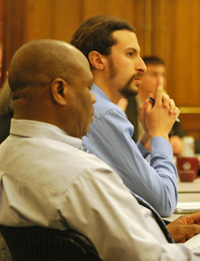
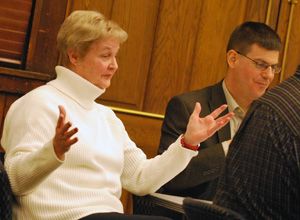
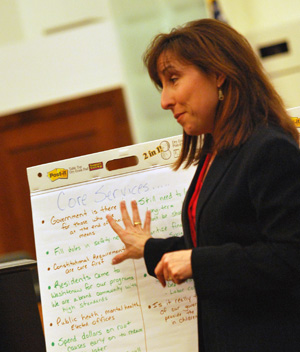
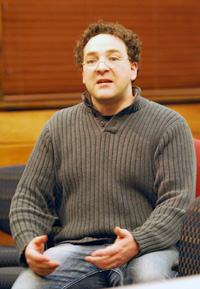
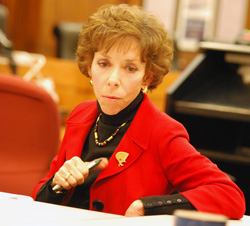
One thing I am wondering is who at the county level authorizes the filing of lawsuits in the county’s name.
annarbor.com reports that the County of Washtenaw has retained the outside attorney Cynthia Reach of the Reach Law Firm in Ann Arbor to commence legal proceedings for libel against a homeless veteran claiming alleged misconduct by two WCSD deputies.
An action has already been commenced in The circuit court and a hearing is scheduled before Judge Melinda Morris this Wednesday to compel the man, who apparently now resides in Roseville, to produce flyers he allegedly has been distributing.
While finding ways to trim waste in the budget may be tough, this expenditure in legal fees by the county to sue a clearly uncollectible person takes the cake. The publicity it has received in the media due to the county’s legal proceedings have ensured that the homeless man’s allegations will receive more public exposure than he could ever have dreamed by simply posting flyers. The annarbor.com article also has identified by name the two deputies involved.
I cannot fathom what the county hopes to gain by expending potentially thousands of dollars from the county treasury in an attempt to obtain a libel judgment against a recently homeless veteran.
I am wondering if the County Commission approved such an expenditure? Or if they are even aware that someone in the county authorized such a suit at taxpayers’ expense.
Thanks to you, Mary, we will not “lose” what we talked about at our retreats. You do the community a great service.
Yes, I agree. The Chronicle’s coverage of Washtenaw County government has been a great service and very refreshing, since this area previously received very little news coverage.
Those of us who live in Ann Arbor frequently have less understanding of all the important functions that the county serves than those who live outside the city. We may be most conscious of the social safety net aspects, for example.
However, I would urge the new Commissioner Rabhi to look beyond poetry and idealism to see that many county services are essential to maintenance of our entire civil and physical system. In particular, the environmental and public health functions are key to all county residents, even if they are not disadvantaged. The “core services” are called that for a reason. That does not mean that all departments should not be called on to find economies, but we should avoid losing the technical expertise and institutional competence that help to support our quality of life in this county. These services are mostly invisible only because they work so well.
Mr. Rabhi’s comments about localization are interesting to me,as I personally support that concept. But it should not be interpreted as casting loose from Federal and State monetary support for their mandated services.
And please, keep the transparency. Mr. Smith often complains about it, but this is the people’s work.
I’d also like to caution commissioners from taking too much of a ROI (return on investment) perspective. Many benefits of services can be understood intuitively but difficult to subject to a metrics test. To choose a non-county example, I was appalled to hear that President Obama is choosing not to fund Great Lakes restoration efforts. It is doubtless difficult to document what is the actual economic benefit of cleaning up the Great Lakes and preserving both their water quality and the safety of food obtained from them, but it is real and apparent.
Commissioners should not fall into what I call false objectivization of decisions that will, ultimately, be made subjectively.